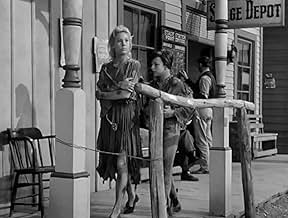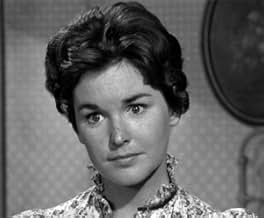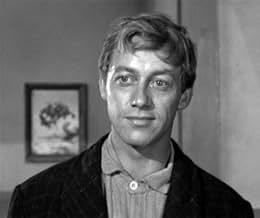The plain but nubile daughter of a hopeless drunkard decides to marry herself off so that she and her little brother might avoid starvation.The plain but nubile daughter of a hopeless drunkard decides to marry herself off so that she and her little brother might avoid starvation.The plain but nubile daughter of a hopeless drunkard decides to marry herself off so that she and her little brother might avoid starvation.
- Director
- Writers
- Stars
Billy E. Hughes
- Joey Glover
- (as Billy Hughes)
Jimmie Booth
- Barfly
- (uncredited)
Rudy Doucette
- Barfly
- (uncredited)
Duke Fishman
- Barfly
- (uncredited)
George Ford
- Barfly
- (uncredited)
Chester Hayes
- Barfly
- (uncredited)
Connie Lamont
- Saloon Girl
- (uncredited)
Billy McCoy
- Townsman
- (uncredited)
- Director
- Writers
- All cast & crew
- Production, box office & more at IMDbPro
7.6288
1
2
3
4
5
6
7
8
9
10
Featured reviews
A woman's lot in the old west
The episode opens with Milly and her brother wandering around Dodge hungry and in rags looking for their father. Literally, they are in filthy rags, as in their clothes could fall from their bodies at any minute! With Milly being seventeen this could become a completely indecent situation! Dad is a hopeless bum who converts into alcohol any money that he finds, yet says how he raises his kids are his business in a time when it really was that way.
Milly visits a girl she knew before she got married and realizes the girl was poor before, but because of marriage she is financially secure and no longer hungry. Thus Milly decides the only way to change her fate is to get married. She borrows a dress from her friend and visits three bachelors in search of a husband. The first is old and fat and he knows it. He figures she is playing a joke on him with her proposal and runs her off. The second is a confirmed woman hating bachelor and also runs her off. The third one is closer to her age - a moonshiner - and likes the idea of sex with the girl but not the idea of marriage ties. She manages to escape his attempted assault.
Milly is angry at these men. Her age is between that of a woman and a child, so she comes up with a rather pointless childish revenge for the very adult feeling of that of a woman scorned, although it seems she dodged three bullets from my perspective. She and her brother vandalize the property of the men who rejected her. The result yields more than she bargained for, but it also gives her and her brother a way out of their impoverished situation.
At the beginning I figured that one of the three men would turn out to be a diamond in the rough, that he and Milly would agree to a marriage of convenience that would evolve into love. Nope, there are very few traditional happy endings on Gunsmoke.
Milly visits a girl she knew before she got married and realizes the girl was poor before, but because of marriage she is financially secure and no longer hungry. Thus Milly decides the only way to change her fate is to get married. She borrows a dress from her friend and visits three bachelors in search of a husband. The first is old and fat and he knows it. He figures she is playing a joke on him with her proposal and runs her off. The second is a confirmed woman hating bachelor and also runs her off. The third one is closer to her age - a moonshiner - and likes the idea of sex with the girl but not the idea of marriage ties. She manages to escape his attempted assault.
Milly is angry at these men. Her age is between that of a woman and a child, so she comes up with a rather pointless childish revenge for the very adult feeling of that of a woman scorned, although it seems she dodged three bullets from my perspective. She and her brother vandalize the property of the men who rejected her. The result yields more than she bargained for, but it also gives her and her brother a way out of their impoverished situation.
At the beginning I figured that one of the three men would turn out to be a diamond in the rough, that he and Milly would agree to a marriage of convenience that would evolve into love. Nope, there are very few traditional happy endings on Gunsmoke.
A Pessimistic View of Humanity with Stellar Acting
In a 20-year run, one can expect some odd episodes here and there, and this is definitely one of the more offbeat Gunsmoke episodes.
Jena Engstrom plays Milly Glover, a poor 17-year-old who lives near Dodge with her little brother Joey and their horrible father, Bart, who is a drunk and only sees his two children as nuisances. Milly is too proud to accept help from anyone, despite the fact she and Joey are starving.
After visiting her friend, Laura, who shared Milly's poor background until she married a man named Sam that provides a good home, nice clothes, furniture, and plenty of food, Milly decides her best course of action is to get married. The problem with her idea is that she only considers three of the worst scoundrels one could imagine as husband candidates.
From that foundation, this episode takes some unexpected twists and turns as it moves toward a somewhat inconclusive conclusion.
There are some things about this episode I find quite disturbing. For one, too many of the characters are sadistic monsters. Milly tends to ignore offers for help from the kind people she encounters--namely Miss Kitty, Matt, and her friend Laura. But she pursues hopeless relationships with some of the most ornery, sadistic, downright evil people she could ever hope to meet. Maybe her upbringing by her useless, monstrous father has made her resolved to that kind of life.
Another thing that bugs me is that Engstrom, who is a fine actress and handles the role here well, seems to be miscast. Many other characters refer to her as being ugly. Engstrom was an attractive young lady at that time. It is difficult to see her as many of the other characters in the episode describe her.
The view of marriage here is quite negative. Even Milly's friend Laura seems to have only married her husband for the things he can provide. Marriage in this story is only a matter of convenience. (This is a common thematic element in John Meston's stories.)
I think the most troubling aspect of this episode is John Meston's characters. There are just too many people who have virtually no redeeming qualities. We naturally want to root for Milly and Joey, but Milly repeatedly refuses people that could help in favor of uncaring, unfeeling scoundrels. One has to think Meston wrote this episode with an unusually pessimistic outlook on humanity. However, I also wonder if Meston was attempting to write Milly as more heroic than she actually comes across in the story. Maybe he just missed the mark?
There are some great performances here. Engstrom always stood out in any of the shows in which she appeared during this time. Billy Hughes as Joey is another actor that had a tendency to shine in the opportunities he was given. Malcolm Atterbury plays Bart Glover with the necessary level of drunken meanness. Sue Randall, perhaps best known as Miss Landers on Leave It to Beaver, makes a brief appearance here as Laura.
Don Dubbins as Ed Potts is a stark contrast in this episode to the character Orkey Cathcart he would play just a few episodes later in the season in the "Marry Me" episode. James Griffith as the extremely cruel Harry Tillman and Harry Swoger as mean ol' Sam Lawson are both memorable in any appearance they make.
Viewers of the episode must endure the dark, pessimistic view of humanity in order to treasure the excellent, individual performances. It is definitely a memorable story.
Jena Engstrom plays Milly Glover, a poor 17-year-old who lives near Dodge with her little brother Joey and their horrible father, Bart, who is a drunk and only sees his two children as nuisances. Milly is too proud to accept help from anyone, despite the fact she and Joey are starving.
After visiting her friend, Laura, who shared Milly's poor background until she married a man named Sam that provides a good home, nice clothes, furniture, and plenty of food, Milly decides her best course of action is to get married. The problem with her idea is that she only considers three of the worst scoundrels one could imagine as husband candidates.
From that foundation, this episode takes some unexpected twists and turns as it moves toward a somewhat inconclusive conclusion.
There are some things about this episode I find quite disturbing. For one, too many of the characters are sadistic monsters. Milly tends to ignore offers for help from the kind people she encounters--namely Miss Kitty, Matt, and her friend Laura. But she pursues hopeless relationships with some of the most ornery, sadistic, downright evil people she could ever hope to meet. Maybe her upbringing by her useless, monstrous father has made her resolved to that kind of life.
Another thing that bugs me is that Engstrom, who is a fine actress and handles the role here well, seems to be miscast. Many other characters refer to her as being ugly. Engstrom was an attractive young lady at that time. It is difficult to see her as many of the other characters in the episode describe her.
The view of marriage here is quite negative. Even Milly's friend Laura seems to have only married her husband for the things he can provide. Marriage in this story is only a matter of convenience. (This is a common thematic element in John Meston's stories.)
I think the most troubling aspect of this episode is John Meston's characters. There are just too many people who have virtually no redeeming qualities. We naturally want to root for Milly and Joey, but Milly repeatedly refuses people that could help in favor of uncaring, unfeeling scoundrels. One has to think Meston wrote this episode with an unusually pessimistic outlook on humanity. However, I also wonder if Meston was attempting to write Milly as more heroic than she actually comes across in the story. Maybe he just missed the mark?
There are some great performances here. Engstrom always stood out in any of the shows in which she appeared during this time. Billy Hughes as Joey is another actor that had a tendency to shine in the opportunities he was given. Malcolm Atterbury plays Bart Glover with the necessary level of drunken meanness. Sue Randall, perhaps best known as Miss Landers on Leave It to Beaver, makes a brief appearance here as Laura.
Don Dubbins as Ed Potts is a stark contrast in this episode to the character Orkey Cathcart he would play just a few episodes later in the season in the "Marry Me" episode. James Griffith as the extremely cruel Harry Tillman and Harry Swoger as mean ol' Sam Lawson are both memorable in any appearance they make.
Viewers of the episode must endure the dark, pessimistic view of humanity in order to treasure the excellent, individual performances. It is definitely a memorable story.
Did you know
- TriviaMilly was supposed to be 17-years-old. Jena Engstrom, the actress who portrayed her, was 19-years-old.
Details
- Release date
- Country of origin
- Language
- Filming locations
- Stage 5 & Stage 6, Paramount Sunset Lot, 5800 Sunset Blvd, Los Angeles, California, USA(Dodge City Western Street)
- Production companies
- See more company credits at IMDbPro
- Runtime
- 1h(60 min)
- Color
- Aspect ratio
- 1.33 : 1
- 4:3
Contribute to this page
Suggest an edit or add missing content
















